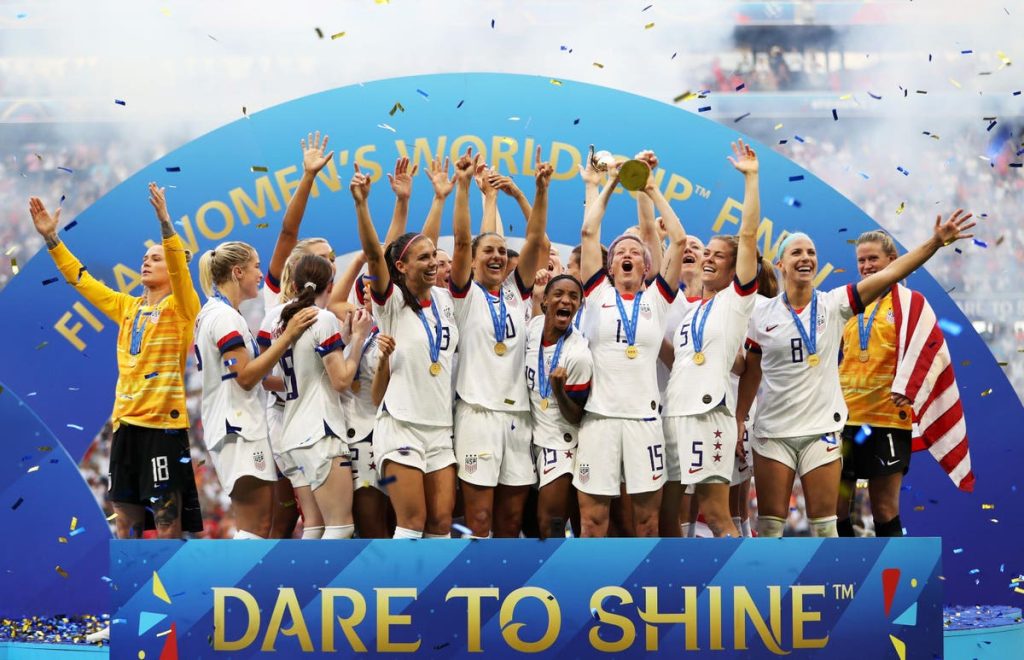The 2023 Women’s World Cup tournament begins this week to great fanfare and broadcasting revenues estimated at close to $200 million. This is great news for the sport’s global governing body, the Fédération Internationale de Football Association (FIFA)— but not so great for the women players on the field.
As a flagship event in women’s sport, the Women’s World Cup is an important moment to reflect on how in many countries, women and girls have to fight even to get onto a playing field. And once they do, they face threats and retaliation, unfair pay, harassment, and sexual assault.
FIFA President Gianni Infantino, whose base salary and bonus package is $3.9 million, promised in June that every player in the tournament would get at least $30,000—implicitly acknowledging past Women’s World Cup wage theft.
But now Infantino is reneging on even this paltry guarantee—saying at the news conference opening the games that how and whether to pay the women players would be up to the national soccer federations.
This is shocking but hardly surprising considering FIFA’s dismal record in failing to protect women and girls in the sport. Far from equalizing tournament prize money as has happened in sports such as tennis, FIFA fails on pay issues and even on basic workplace systems to safeguard players from sexual and other abuses.
There’s plenty of money to ensure a living wage to women players. With FIFA’s $4 billion in reserves and expected $11 billion in revenue in the 2026 World Cup cycle, it is only gender discrimination that keeps FIFA from leveling the pay playing field at the Women’s World Cup.
The total prize money awarded by FIFA for the 2019 Women’s World Cup—which reached 1.12 billion viewers globally and broke U.S. viewership records with 25.4 million viewers—was $30 million. After significant global pressure, this year’s pool of prize money will increase to $110 million—still far below the $400 million at the 2018 Men’s World Cup or the $440 million awarded in the 2022 Men’s World Cup.
FIFA funds each national team with an average of $1.5 million a year. Unfortunately, this money intended to build women’s sport is too often siphoned off by national federations before it reaches the players who earned it.
FIFA could but doesn’t use its leverage as the sport’s main funder to ensure that every national federation treats women athletes fairly. Women’s national team players tell Human Rights Watch that these funds instead fuel corruption and the most appalling sexual abuse.
An important recent study by FIFPRO, the global professional footballers’ union, exposed that 29 percent of women players who responded said that they had not received any payments from their national teams for World Cup qualifying tournaments.
The mothers of players on Jamaica women’s national team had to set up a crowdfunding campaign to cover the costs of competing in the Women’s World Cup. Reggae Girlz players Cheyna Matthews and Khadija “Bunny” Shaw posted their “utmost disappointment with the Jamaica Football Federation” over “subpar planning, transportation, accommodations, training conditions, compensation, communication, nutrition and resources.”
“We have shown up repeatedly without receiving contractually agreed-upon compensation,” the Jamaican players wrote.
The Nigerian women’s national team, the Super Falcons, has been publicizing egregious wage theft for years and threatened to boycott its first World Cup match.
In South Africa, the Banyana Banyana national women players are paid a tenth of what men make. Publicizing their anger with the South African Football Association over pay, preparation, and training, the entire squad withdrew in protest from the final warm-up match before the Women’s World Cup.
In total, 150 top women national team players signed a letter to FIFA demanding equal tournament pay and conditions.
It is wrong that female footballers who have reached the pinnacle of their sport cannot depend on FIFA to guarantee the pay they have earned, and it exposes corrupt governance and lack of human rights controls that is also behind many other abuses of women and girls in the sport.
Australia is co-hosting this year’s tournament with neighboring New Zealand. Members of the Matildas, Australia’s national women’s soccer team, have responded to this structural inequality by calling out FIFA in a forceful video condemning the discriminatory gender pay gap worldwide.
“While prize money has advanced, it’s still only 25 percent of what the men get,” Professional Footballers Australia co-chief executive and former top scorer Kate Gill told Australian Associated Press. In 2015, the Matildas had to strike to demand equal pay and prize money for tournaments as the Australia national men’s team, the Socceroos. Since 2019, a collective bargaining agreement has guaranteed equal pay for the Australian national teams.
So far, seven women’s national teams have fought for and achieved some version of pay equity. But for most of the 736 women on the 32 competing teams, daily working conditions remain far from equal with the men’s national teams.
FIFA has the funds to establish pay equity, but not the political will. By contrast, in tennis women players fought for and won equal pay at the US Open in 1973—half a century ago.
This Women’s World Cup is sure to spotlight amazing women’s sport performances. Perhaps as important, it is also spotlighting the urgent need to end the dysfunction at FIFA that cheats and abuses the women players who deliver its tournaments.
Read the full article here









